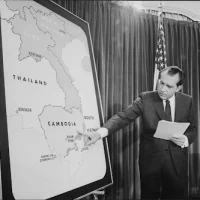Malcolm Toon was a fluent Russian speaker and one of the State Department’s top experts on the Soviet Union during the Cold War. He was ambassador to Czechoslovakia, Yugoslavia, Israel, and the Soviet Union. Toon was characterized in The New York Times in 1978 as “one of the most influential of the postwar ambassadors in… Read More "The Rough Road to Moscow for Malcolm Toon "
When President Richard Nixon took office in 1969, he and National Security Adviser Henry Kissinger vowed to find a way to end U.S. involvement in Viet Nam quickly and honorably without appearing to cave in to communist pressure. The U.S. launched a secret air campaign, thirteen major military operations, against North Vietnamese bases in Cambodia.… Read More "The U.S. Incursion into Cambodia"
Chipping Away at Czechoslovak Communism: The Helsinki Final Act and Charter 77
The Solidarity Movement. Perestroika and Glasnost. The fall of the Berlin Wall. All of these movements, policies, or events had a tremendous influence on the dissolution of communism in Eastern Europe and the end of the Cold War. While not attributed the same attention and certainly less well known, many diplomats operating behind the Iron… Read More "Chipping Away at Czechoslovak Communism: The Helsinki Final Act and Charter 77"
Bombing North Vietnam into Accepting Our Concessions: Christmas Bombings, 1972
President Richard Nixon ordered plans for retaliatory bombings of North Vietnam after talks to end the war in Vietnam broke down December 13, 1972. Operation Linebacker II, otherwise known as the “Christmas Bombings,” began December 18 and lasted for two weeks. A total of 741 B-52 sorties were dispatched, dropping 20,000 tons of bombs on… Read More "Bombing North Vietnam into Accepting Our Concessions: Christmas Bombings, 1972"
Anatomy of an Overthrow: How an African Leader was Toppled
A council of combined security forces known as the Derg staged a coup d’état on September 12, 1974 against Ethiopian Emperor Haile Selassie I, arresting and imprisoning the monarch who had ruled for decades. The committee renamed itself the Provisional Military Administrative Council, took control of the government, soon abolished the monarchy and established Marxism-Leninism… Read More "Anatomy of an Overthrow: How an African Leader was Toppled"
Regarding Henry, Protecting Nancy – On Security Detail with the Kissingers
Traditionally, Secretaries of State receive a personal protection detail from the State Department’s Diplomatic Security Service (DSS). However, Henry Kissinger eschewed the DS detail in favor of the Secret Service protection he had as the National Security Advisor at the White House. His wife Nancy, a brilliant and glamorous New York aristocrat who spent years… Read More "Regarding Henry, Protecting Nancy – On Security Detail with the Kissingers"
Give and you Shall Receive…a Signature from Henry Kissinger
When Henry Kissinger became Secretary of State in September 1973, he declined the usual Diplomatic Security (DS) protective detail, preferring the protection of the Secret Service as he was already under its protection as the head of the National Security Council (NSC) and had a good relationship with the detail leader, Walter Bothe. His wife,… Read More "Give and you Shall Receive…a Signature from Henry Kissinger"
Admitting the Shah to the U.S.: Every Form of Refuge has its Price
Mohammed Reza Pahlavi, the Shah of Iran, departed Iran on January 16, 1979, fleeing political unrest led by the Ayatollah Khomeini and seeking medical treatment for lymphoma. Pahlavi first flew to Aswan, Egypt, where Anwar Sadat welcomed him, and would spend the next ten months moving among Morocco, Mexico, the Bahamas and Panama while requesting… Read More "Admitting the Shah to the U.S.: Every Form of Refuge has its Price"
Bad Blood: The Sino-Soviet Split and the U.S. Normalization with China
In the 1960s, in the depths of the Cold War, the world was viewed in terms of a zero-sum game: wherever the USSR won, the U.S. by definition lost. The People’s Republic of China (PRC), despite its massive size, was considered to be the Soviets’ little brother and thus not a real player. The State… Read More "Bad Blood: The Sino-Soviet Split and the U.S. Normalization with China"
Far from the Madding Crowd — Leeds Castle and the Road to Camp David
“Where you stand depends on where you sit” – an oft-heard epigram used to describe negotiations. And it’s true – something as simple as a seating arrangement, with one side facing the other across a long table can only serve to encourage rigidity and a sense that the negotiations are a zero-sum game. Because of… Read More "Far from the Madding Crowd — Leeds Castle and the Road to Camp David"

